Evidence for Electromagnetic Acceleration
High Altitude Horizon Dip
JTolan has provided an interesting series of videos where a camera with an infrared filter is taken up on a plane and he is able to see much further than the Round Earth Theory should allow. Mountains and other bodies which should be below the horizon are instead above the horizon and visible.
In his Infrared Flight over Gulf of Mexico video an analysis is performed showing that, although he can see various bodies much further than should be seen, the horizon is not where it should be on either a Flat Earth or a Round Earth prediction. According to a Flat Earth prediction the horizon should be at 0 degrees eye level. According to a Round Earth prediction, the horizon should be at 3.2 degrees below eye level.
Infrared Flight over Gulf of Mexico HD1080 (16:00 mark)
"Globe Horizon" is the prediction for the globe. "Globe Horizon (4/3R)" is the globe earth + standard refraction theory.
If the above analysis is accurate it may suggest that either:
- The earth is round and massive downwards bending of light is occurring
- The earth is flat and massive upwards bending of light is occurring
- Light is traveling in straight lines and the earth is something else (ie. a globe much larger than claimed, other)
If the earth is flat, JTolan's work would suggest that light is bending upwards on a large scale.
Gulf of Mexico Analysis
Location
According to the author, he is 33,000 feet in altitude. His GPS and flight path shows that he is is 71 miles from the start of Joseph Bay and 79 miles from the far end of it.
Degrees Below Eye Level Scale
On a Flat Earth with traditional perspective theory and an eye level horizon, an object in the distance must be at an altitude of 30,000 feet in order to be at eye level with an observer who is at an altitude of 33,000 feet. We may compute the size of this space in degrees with an angular diameter calculator.
https://rechneronline.de/sehwinkel/angular-diameter.php
Knowing that the St. Joseph Bay is 71 miles, or 374,880 feet, from the observer, we may use the above angular diameter calculator to find that 33,000 feet at a distance of 374,880 feet away makes up a space of 5.04 degrees to the observer. Therefore the start of St. Joseph Bay is 5.04 degrees below eye level. Performing the same for the end of St. Joseph Bay, 33,000 feet at a distance of 79 miles, or 417,120 feet, makes up a space of 4.531 degrees. Therefore the end of St. Joseph Bay is 4.531 degrees below eye level.
Subtracting the two, an equidistant scale may be created upon the image with the space between the start and end of St. Joseph Bay representing 0.509 degrees, which is consistent with JTolan's scale above.
Round Earth Horizon Dip
The horizon dip for a geometric Round Earth and a Round Earth with 'Standard Refraction' may be verified with MetaBunk's Earth Curve Calculator. For a height value 33,000 feet and a distance value 300 miles away (distance value does not matter for horizon dip), the result is the following:
- With "Standard" refraction adjustment of 7/6 radius (4618.83 miles)
- Refracted Horizon = 240.36 miles (1269117.82 feet)
- Refracted Drop= 9.75 miles (51495.93 feet)
- Refracted Hidden= 2032.74 feet (24392.88 inches)
- Refracted Horizon Dip = 2.979 Degrees, (0.0520 Radians)
- Geometric results (no refraction)
- Geometric Horizon = 222.55 miles (1175040.99 feet)
- Geometric Drop = 11.38 miles (60101.56 feet)
- Geometric Hidden= 4000.08 feet (48000.95 inches)
- Geometric Horizon Dip = 3.217 Degrees, (0.0562 Radians)
These values for the Round Earth 'horizon dip' are consistent with JTolan's scale above. The horizon should be 3.217 degrees below eye level with a Geometric Round Earth prediction and 2.979 degrees below eye level with a Standard Refraction Round Earth prediction.



